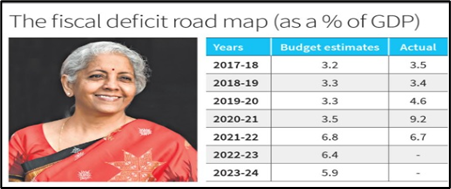Why in news?
- In the Union Budget for 2023-24, Government chose the path of relative fiscal prudence.
- It projected a decline in fiscal deficit to 5.9% of gross domestic product (GDP) in FY24, compared with 6.4% in FY23.
- The fiscal deficit, in mathematical terms, is [total revenue generated — total expenditure].
- It is an indication of the total borrowings needed by the government.
What’s in today’s article?
News Summary: Fiscal deficit targets and performance of government
- While presenting the Union Budget 2023-24, Union Finance Minister said the government planned to continue on the path of fiscal consolidation.
- It aims to reach a fiscal deficit below 4.5% by 2025-26.
What is the direction on fiscal deficit given in the Budget?

- In Union Budget 2023-24, the fiscal deficit to GDP ratio is pegged at 5.9% in FY24.
- This ratio has declined from 6.4% in 2022-23 (revised estimate) and 6.7% in 2021-22 (actual).
- In Union Budget 2023-24, revenue deficit is 2.9% of GDP.
- The revenue deficit was 4.1% of GDP in 2022-23 (revised estimate).
- The primary deficit, which reflects the current fiscal stance devoid of past interest payment liabilities, is pegged at 2.3% of GDP in Union Budget 2023-24.
- Primary deficit stood at 3% of GDP in 2022-23 (RE).
- If interest payments are deducted from fiscal deficit, we get primary deficit.
Are allocations lower for some sectors?
- As seen from the following figure, the major allocations that have been pared down are food, fertilizer and petroleum subsidies.

- It is a laudable decision to extend food security to the poor for one more year amid rising inflation.
- However, rationalisation of subsidies is important so that the government can move towards reaching a fiscal deficit target of 4.5% by 2025-26.
What needs to be done for growth?
- Inflation hurts the poor. The interest rate management by the RBI through inflation targeting alone cannot effectively control inflation, given the supply side shocks.
- Therefore, fiscal policy measures are crucial to tackle mounting inflation. Policy coordination between RBI and government is crucial for a sustained growth recovery process.
- The RBI has been increasing policy rates to tackle mounting inflation. But a high interest rate regime can hurt the economic growth process.
- So, the fiscal policy needs to remain accommodative with focus on gross capital formation in the economy with enhanced capital spending, especially infrastructure investment.
- Infrastructure investment has a larger multiplier effect on economic growth and employment.
- In Budget 23-24, capital spending is expected to rise to 3.3% of GDP.
- The interest-free loan of ₹1.3 lakh crore for 50 years provided to States should help them spend and boost growth.
Can the govt. stick to fiscal consolidation?
- The predominant mode of financing fiscal deficit in India is through internal market borrowings.
- It is also to be financed through securities against small savings, provident funds and a component of external debt.
- In Union Budget 2023, India’s external debt is pegged at ₹22,118 crore of the total fiscal deficit of ₹17,86,816 crore in 2023-24 (BE), which is approximately about 1%.
- In Union Budget 2023, it is also stated that the States will have to maintain a fiscal deficit of 3.5% of GSDP of which 0.5% will be tied to power sector reforms.
- There are revenue uncertainties in post-pandemic times and also geopolitical risks, mounting inflation, supply chain disruptions and energy price volatility.
- Despite all this, it can be said that the Government has kept the fiscal policy accommodative and has undertaken capital spending to support economic growth recovery.
- In doing so, it has not deviated from the path of fiscal consolidation.
What lies ahead?
- The Finance Minister is focusing on economic growth recovery through capex. She contends that infrastructure investment will boost private investment.
- In the fiscal deficit-GDP ratio, if the denominator GDP expands, it will reduce the overall fiscal deficit-GDP ratio. Her focus is on economic growth recovery to strengthen GDP.
Conclusion
- The Union Budget has a dual focus on growth and fiscal consolidation.
- In other words, the government has tried to do a Goldilocks balance on the fiscal deficit - not too much consolidation, nor leave everything related to consolidation for the future.











